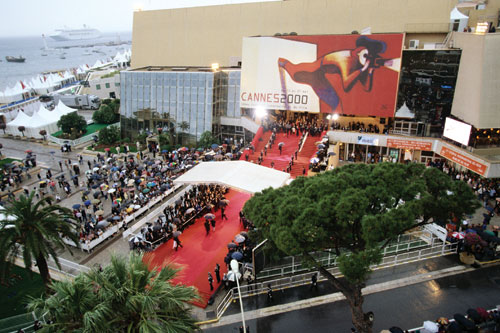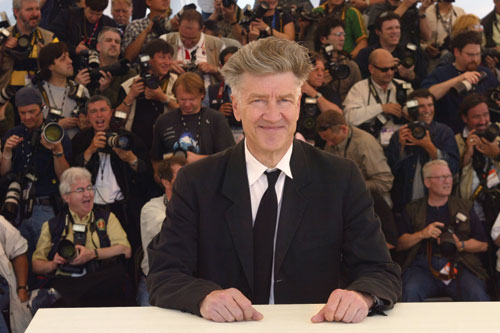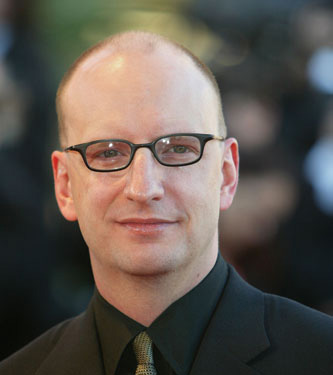BY JAMES ULMER
 ON THE CROISETTE: On a shimmering patch of the Riviera, Cannes
ON THE CROISETTE: On a shimmering patch of the Riviera, Cannes
is a combination of spectacle, art and commerce that celebrates
directors. (Credit: Rufus F. Folkks/CORBIS)
Perhaps no film forum can influence a director's global reputation and career more dramatically than the Cannes Film Festival, which celebrates its 60th anniversary this May. More than a festival, it's a force field. Winning an official prize can launch a career—think Soderbergh, Campion, the Coen Brothers—and secure worldwide distribution for a film, while losing can make the film a tough sell (remember Brown Bunny?).
Cannes' power to be both perilous and magnanimous lies partly in the fact that it is as much a sales bazaar as it is a cinema showcase. A director preparing to work the Croisette—a patch of Riviera turf teeming with buyers and sellers, celebrities and wannabes—can find plenty of uses for its crazed collision of art and commerce. As a filmmaker, he or she can nab instant, worldwide media exposure by screening a picture to 4,000 international journalists. As a deal maker, a director can brave the sprawling Cannes market to help producers hunt down buyers for the next project, or find funding partners at one of Cannes' countless villa, yacht and beach parties.
But for filmmakers, the festival's most enduring allure comes from the unique regard it holds for directors. Cannes was the first festival to recognize them as the true auteurs of their movies when the French New Wave spilled onto its shores in the late '50s and '60s, making filmmakers like Truffaut and Godard international celebrities. "Cannes is a discoverer, a career accelerator, a watching post of fashions, genres and artistes," said its president and longtime chief selector, Gilles Jacob, during the festival in 2005, "but it is the cinema's auteurs who are celebrated here like nowhere else on Earth."
American directors at Cannes have often been feted with top prizes and competition slots. Billy Wilder won in 1946 for The Lost Weekend, Del Mann in 1955 for Marty and Dennis Hopper for best first feature in 1969 for Easy Rider. This was followed by the golden year of 1974, when Altman (Thieves Like Us), Coppola (The Conversation), Ashby (The Last Detail) and Spielberg (Sugarland Express) all had films in the main competition. One of the biggest coups de cinema for Americans came in the late 1980s and early 1990s, when a new wave of fiercely independent directors scored a celebrated "triple slam" by taking Cannes' top prize for three years running. Steven Soderbergh won a Palme d'Or for sex, lies, and videotape, followed by David Lynch's Wild at Heart in 1990 and the Coen Brothers for 1991's Barton Fink.
And prior to that, New York-based and Harvard-educated Mira Nair earned the coveted Camera d'Or for best first feature, along with the festival's audience award, for 1988's Salaam Bombay! Most recently, Americans struck gold in 2003 with Gus Van Sant's Elephant, and again in 2004 with Michael Moore's Fahrenheit 9/11, the first documentary to be honored.
With the festival approaching, we asked Soderbergh, Lynch, Nair and Van Sant to share their experiences of navigating the often exhilarating, exhausting and sometimes treacherous waters of the world's premiere film gathering. Here are some reports and advice from a few successful survivors.
For an American director, a win at Cannes can firmly establish his name throughout Europe, or even salvage a sputtering international reputation. Would Soderbergh the struggling auteur have become Soderbergh the brand-name global export without the imprimatur of his 1989 win for sex, lies, and videotape?
"There's no question Cannes made my name in Europe, absolutely," Soderbergh says. "You really can't put a figure on how much it amplified the movie worldwide. Only in subsequent years could I look back and realize how high the stakes are at Cannes and how crazy the emotions get. Otherwise, I think I would have been freaked out."
But at Cannes, opportunity can spell danger, too. "It's perilous in the sense that it's a hugely public place, and just as you can be celebrated and cheered, your film can be booed and reviled," noted Nair. "It can be publicly humiliating. Fortunately, I haven't had that experience." Soderbergh agreed: "Sure, the power of the festival can work in both directions."
Gallic critics, for example, greeted a Cannes press screening of Sofia Coppola's unorthodox Marie Antoinette last year with boos and a few catcalls, though the film went on to do respectable business in France.
So how can a director lessen the risk of a Cannes crash and burn, whether or not his movie scores a berth in the official lineup? Word to the wise: come prepared. "You have to go in there with the support of some sort of entity, even if it's only a publicist and not a distributor," Nair says. "You've got to go in with your guns blazing, your publicity and all your elements put together."
 PHOTO OP: David Lynch surrounded by paparazzi at a 2002 press conference
PHOTO OP: David Lynch surrounded by paparazzi at a 2002 press conference
when he was president of the Jury. (Credit: Stephanie Cardinale/CORBIS)

ROYALTY: Steven Soderbergh arriving as a member of the jury in
2003, won the Palme d'Or for sex, lies and videotape in 1989.
(Credit: Pascal Le Segretain/Getty Images)
A director should also have a sense of whether his movie and the festival's tastes are a good match. "I think you have to be smart about what kind of movie you're placing into competition, which is seen through a very different lens than the rest of the categories," Soderbergh suggests. "Meaning, a competition film should be ambitious ideologically as well as ambitious in its filmmaking."
That competition "lens" is usually focused on dramas and "serious" material. "I tend to think that a comedy might not play as well to the Cannes juries, depending on the kind of comedy," says Van Sant. Dark ones fare best: witness the Coen Brothers' Barton Fink competition win in 1991.
Even if a film rates a competition invite, should the director necessarily accept the honor? Strange as it may seem, Soderbergh didn't for his indie film The Limey. He decided, shrewdly, that his ambitious crime story was more suitable for one of Cannes' special midnight screenings, where it was shown out of competition.
Still, an official Cannes debut, or even a prize, usually has little commercial impact on a film's U.S. release, or on its director's bankability outside Europe. "Other than Fahrenheit 9/11, sex, lies, and videotape, and Pulp Fiction, I think one of the only Palme d'Or winners that had any real success in the States was Roland Joffé's The Mission in 1986," observes veteran Hollywood Reporter critic Duane Byrge. "But Warner Bros. was shrewd enough to know it was the type of movie that would thrive, even if a culturally effete Cannes jury didn't pick it. The Mission's win enhanced the festival's credibility, perhaps, more than the Palme d'Or invigorated Warner Bros.' marketing."
There are exceptions, of course. Van Sant's out-of-competition entry To Die For had tested poorly for its studio, Sony, before it came to Cannes in 1995, "largely because they were selling it as a comedy instead of a dark comedy," says the director. But the studio altered its strategy when the film was a hit with the festival's press corps. "Without the reaction from Cannes, Sony probably would have shelved it," Van Sant surmises. "It made them take it seriously."
More famously, in 1979 Francis Ford Coppola had such a tortuous time making and editing Apocalypse Now that he was unable to deliver a completed print in time for the competition, screening instead a work in progress to a select group of critics and jurors. Nonetheless, the film went on to share the Palme d'Or with The Tin Drum, thereby quieting fears in the U.S. press that Coppola had wasted 10 months in the jungles of the Philippines.
Talent aside, luck plays a big part in "making it" on the Croisette. Perhaps the classic example is sex, lies, and videotape, a movie its director never imagined was even competition material.
"We were the beneficiaries of a couple of strange developments that ended up playing a crucial part in our win," Soderbergh recalls. For starters, at the last minute Wim Wenders replaced Francis Ford Coppola as competition jury president, thereby earning sex its most vocal and adamant champion. And in another stroke of good fortune, Dennis Hopper's movie Backtrack dropped out of competition at the last minute, leaving festival officials scrambling to find a replacement before plucking Soderbergh's film from the Critics' Week, a festival sidebar. The rest, as they say, is Cannes history.
Soderbergh himself was the biggest lucky break that director Van Sant could have wished for when he screened Elephant for the competition jury, which that year counted Soderbergh a member and French director Patrice Chéreau its president. "They were just the right guys at that moment for that film," says Van Sant. "In Cannes, everything is contingent upon the humor of the jury at the time."
Even prize winners, however, aren't immune from the sting of Cannes' bad luck. "I've been rejected by Cannes many times," says Nair, who served on the competition jury in 1990. Both Monsoon Wedding and her newest feature, The Namesake, didn't make the cut. "The selectors said they were 'crowd pleasers' and I guess they thought Cannes wasn't about that," she says. "In the end, it's all about patronage." (In a happily ironic twist, Monsoon was snatched up by Venice and went on to win its top prize, a Golden Lion for best feature.)
Regardless of a film's festival fate, directors can always flog their masterpiece to the foreign buyers in the adjacent tangle of tents and booths known as the Cannes Market. Of course, there's nothing like a festival win to punch up sales, but a director's greatest and most realistic victory at Cannes may simply be to find a distributor for his movie.
"If you're looking for European financing, Cannes can be a very big deal," says Van Sant.
"It's definitely one of the best places for a director to put together a project," adds Nair, who found money for both Monsoon Wedding and Kama Sutra on the Croisette.
Nair's cash-raising karma was evident in her maiden trip to Cannes in 1988. Nine hours after the premiere of Salaam Bombay! triggered an emotional standing ovation and lines of eager buyers, Nair, exhausted from the all-night celebrations and deal making, had sold her movie to nearly every territory in the world come sunrise.
"Even when it's a fairy tale, Cannes is just insanity," she laughed. "But in the end, you make it work."